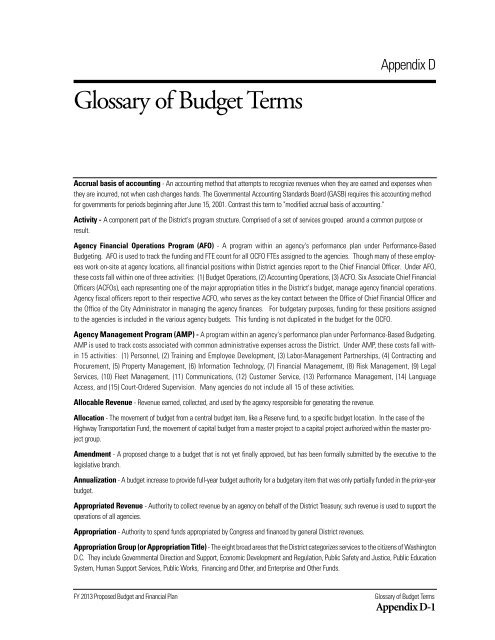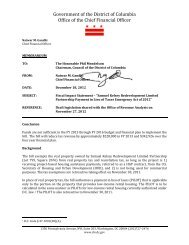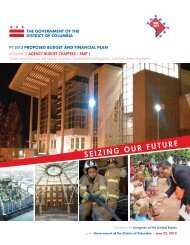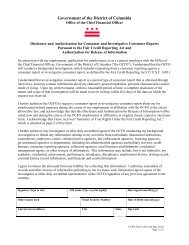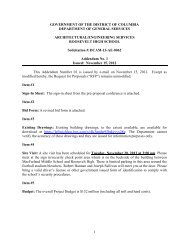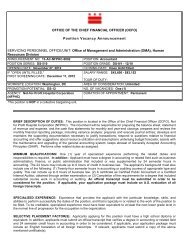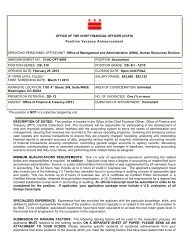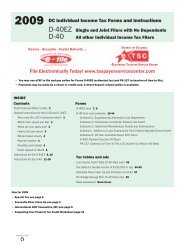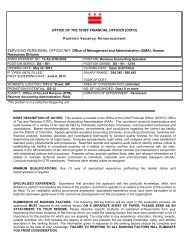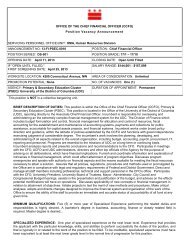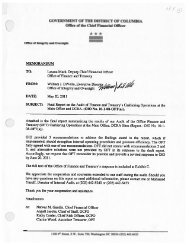Volume 1 - Executive Summary - Office of the Chief Financial Officer
Volume 1 - Executive Summary - Office of the Chief Financial Officer
Volume 1 - Executive Summary - Office of the Chief Financial Officer
Create successful ePaper yourself
Turn your PDF publications into a flip-book with our unique Google optimized e-Paper software.
Glossary <strong>of</strong> Budget Terms<br />
Appendix D<br />
Accrual basis <strong>of</strong> accounting - An accounting method that attempts to recognize revenues when <strong>the</strong>y are earned and expenses when<br />
<strong>the</strong>y are incurred, not when cash changes hands. The Governmental Accounting Standards Board (GASB) requires this accounting method<br />
for governments for periods beginning after June 15, 2001. Contrast this term to "modified accrual basis <strong>of</strong> accounting."<br />
Activity - A component part <strong>of</strong> <strong>the</strong> District's program structure. Comprised <strong>of</strong> a set <strong>of</strong> services grouped around a common purpose or<br />
result.<br />
Agency <strong>Financial</strong> Operations Program (AFO) - A program within an agency's performance plan under Performance-Based<br />
Budgeting. AFO is used to track <strong>the</strong> funding and FTE count for all OCFO FTEs assigned to <strong>the</strong> agencies. Though many <strong>of</strong> <strong>the</strong>se employees<br />
work on-site at agency locations, all financial positions within District agencies report to <strong>the</strong> <strong>Chief</strong> <strong>Financial</strong> <strong>Office</strong>r. Under AFO,<br />
<strong>the</strong>se costs fall within one <strong>of</strong> three activities: (1) Budget Operations, (2) Accounting Operations, (3) ACFO. Six Associate <strong>Chief</strong> <strong>Financial</strong><br />
<strong>Office</strong>rs (ACFOs), each representing one <strong>of</strong> <strong>the</strong> major appropriation titles in <strong>the</strong> District's budget, manage agency financial operations.<br />
Agency fiscal <strong>of</strong>ficers report to <strong>the</strong>ir respective ACFO, who serves as <strong>the</strong> key contact between <strong>the</strong> <strong>Office</strong> <strong>of</strong> <strong>Chief</strong> <strong>Financial</strong> <strong>Office</strong>r and<br />
<strong>the</strong> <strong>Office</strong> <strong>of</strong> <strong>the</strong> City Administrator in managing <strong>the</strong> agency finances. For budgetary purposes, funding for <strong>the</strong>se positions assigned<br />
to <strong>the</strong> agencies is included in <strong>the</strong> various agency budgets. This funding is not duplicated in <strong>the</strong> budget for <strong>the</strong> OCFO.<br />
Agency Management Program (AMP) - A program within an agency's performance plan under Performance-Based Budgeting.<br />
AMP is used to track costs associated with common administrative expenses across <strong>the</strong> District. Under AMP, <strong>the</strong>se costs fall within<br />
15 activities: (1) Personnel, (2) Training and Employee Development, (3) Labor-Management Partnerships, (4) Contracting and<br />
Procurement, (5) Property Management, (6) Information Technology, (7) <strong>Financial</strong> Managememt, (8) Risk Management, (9) Legal<br />
Services, (10) Fleet Management, (11) Communications, (12) Customer Service, (13) Performance Management, (14) Language<br />
Access, and (15) Court-Ordered Supervision. Many agencies do not include all 15 <strong>of</strong> <strong>the</strong>se activities.<br />
Allocable Revenue - Revenue earned, collected, and used by <strong>the</strong> agency responsible for generating <strong>the</strong> revenue.<br />
Allocation - The movement <strong>of</strong> budget from a central budget item, like a Reserve fund, to a specific budget location. In <strong>the</strong> case <strong>of</strong> <strong>the</strong><br />
Highway Transportation Fund, <strong>the</strong> movement <strong>of</strong> capital budget from a master project to a capital project authorized within <strong>the</strong> master project<br />
group.<br />
Amendment - A proposed change to a budget that is not yet finally approved, but has been formally submitted by <strong>the</strong> executive to <strong>the</strong><br />
legislative branch.<br />
Annualization - A budget increase to provide full-year budget authority for a budgetary item that was only partially funded in <strong>the</strong> prior-year<br />
budget.<br />
Appropriated Revenue - Authority to collect revenue by an agency on behalf <strong>of</strong> <strong>the</strong> District Treasury; such revenue is used to support <strong>the</strong><br />
operations <strong>of</strong> all agencies.<br />
Appropriation - Authority to spend funds appropriated by Congress and financed by general District revenues.<br />
Appropriation Group (or Appropriation Title) - The eight broad areas that <strong>the</strong> District categorizes services to <strong>the</strong> citizens <strong>of</strong> Washington<br />
D.C. They include Governmental Direction and Support, Economic Development and Regulation, Public Safety and Justice, Public Education<br />
System, Human Support Services, Public Works, Financing and O<strong>the</strong>r, and Enterprise and O<strong>the</strong>r Funds.<br />
FY 2013 Proposed Budget and <strong>Financial</strong> Plan<br />
Glossary <strong>of</strong> Budget Terms<br />
Appendix D-1


